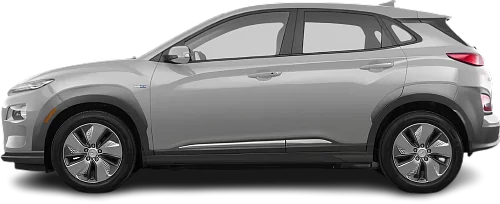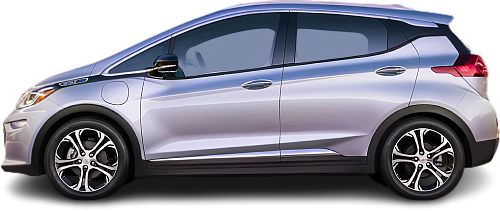Global EV Comparison: Hyundai Kona Electric Long Range vs Chevrolet Bolt EV Gen 1
Struggling to Decide? Let AI Help!
Your AI Summary Is Ready!
General Info
Since both vehicles have been discontinued, they are now only available on the used car market. You can get the Hyundai Kona Electric Long Range (2018-2019) for as low as €19250, while the Chevrolet Bolt EV Gen 1 (2017-2019) was never offered for sale in Europe.
The Hyundai Kona Electric Long Range (2018-2019) is a SUV, whereas the Chevrolet Bolt EV Gen 1 (2017-2019) is a Hatchback.
| Property | Hyundai Kona Electric Long Range | Chevrolet Bolt EV Gen 1 |
|---|---|---|
| Years of Production | 2018-2019 | 2017-2019 |
| Current Status | Discontinued | Discontinued |
| Country of Manufacture | Czech Republic, India, South Korea | USA |
| Body Style | SUV | Hatchback |
| Market Availability | EU | USA |
| Price Europe (Used) | €19250 | - Price Europe (Used) |
| GCC Score | 5.7 | 5.1 |
Range and Efficiency
While the Hyundai Kona Electric Long Range (2018-2019) offers a longer real-world range and a bigger battery, it is less energy-efficient than the Chevrolet Bolt EV Gen 1 (2017-2019).
| Property | Hyundai Kona Electric Long Range | Chevrolet Bolt EV Gen 1 |
|---|---|---|
| Range (EPA) | - Range (EPA) | 383 km |
| Range (WLTP) | 449 km | - Range (WLTP) |
| Range (GCC) | 382 km | 364 km |
| Battery Capacity (Nominal) | 67.5 kWh | 60 kWh |
| Battery Capacity (Usable) | 64 kWh | 57 kWh |
| Efficiency per 100 km | 16.8 kWh/100 km | 15.7 kWh/100 km |
| Efficiency per kWh | 5.97 km/kWh | 6.39 km/kWh |
| Range and Efficiency Score | 6.9 | 7 |
Charging
Both vehicles utilize a standard 400-volt architecture.
The Hyundai Kona Electric Long Range (2018-2019) offers faster charging speeds at DC stations, reaching up to 77 kW, while the Chevrolet Bolt EV Gen 1 (2017-2019) maxes out at 50 kW.
Both vehicles are equipped with the same on-board charger, supporting a maximum AC charging power of 7.2 kW.
| Property | Hyundai Kona Electric Long Range | Chevrolet Bolt EV Gen 1 |
|---|---|---|
| Max Charging Power (AC) | 7.2 kW | 7.2 kW |
| Max Charging Power (DC) | 77 kW | 50 kW |
| Architecture | 400 V | 400 V |
| Charge Port | CCS Type 2 | CCS Type 1 |
| Charging Score | 4.5 | 4.3 |
Performance
Both vehicles are front-wheel drive.
Both cars offer the same motor power, but the Chevrolet Bolt EV Gen 1 (2017-2019) achieves a faster 0-100 km/h time.
| Property | Hyundai Kona Electric Long Range | Chevrolet Bolt EV Gen 1 |
|---|---|---|
| Drive Type | FWD | FWD |
| Motor Type | PMSM | PMSM |
| Motor Power (kW) | 150 kW | 150 kW |
| Motor Power (hp) | 201 hp | 201 hp |
| Motor Torque | 395 Nm | 360 Nm |
| 0-100 km/h | 7.6 s | 7.2 s |
| Top Speed | 167 km/h | 146 km/h |
| Performance Score | 3.8 | 3.5 |
Dimensions
The Hyundai Kona Electric Long Range (2018-2019) and Chevrolet Bolt EV Gen 1 (2017-2019) are about the same size.
Both models have similar wheelbase lengths.
| Property | Hyundai Kona Electric Long Range | Chevrolet Bolt EV Gen 1 |
|---|---|---|
| Length | 4180 mm | 4166 mm |
| Width (with Mirrors) | 2070 mm | 2039 mm |
| Width (w/o Mirrors) | 1800 mm | 1765 mm |
| Height | 1570 mm | 1595 mm |
| Wheelbase | 2600 mm | 2601 mm |
Cargo and Towing
The Chevrolet Bolt EV Gen 1 (2017-2019) provides more cargo capacity, featuring both a larger trunk and more space with the rear seats folded.
Neither car is equipped with a frunk (front trunk).
Neither vehicle is officially rated for towing in in the EU.
| Property | Hyundai Kona Electric Long Range | Chevrolet Bolt EV Gen 1 |
|---|---|---|
| Number of Seats | 5 | 5 |
| Curb Weight | 1760 kg | 1624 kg |
| Cargo Volume (Trunk) | 332 l | 479 l |
| Cargo Volume (Max) | 1114 l | 1603 l |
| Cargo Volume (Frunk) | - Cargo Volume (Frunk) | - Cargo Volume (Frunk) |
| Towing Capacity | - Towing Capacity | - Towing Capacity |
| Cargo and Towing Score | 5.3 | 4.7 |




